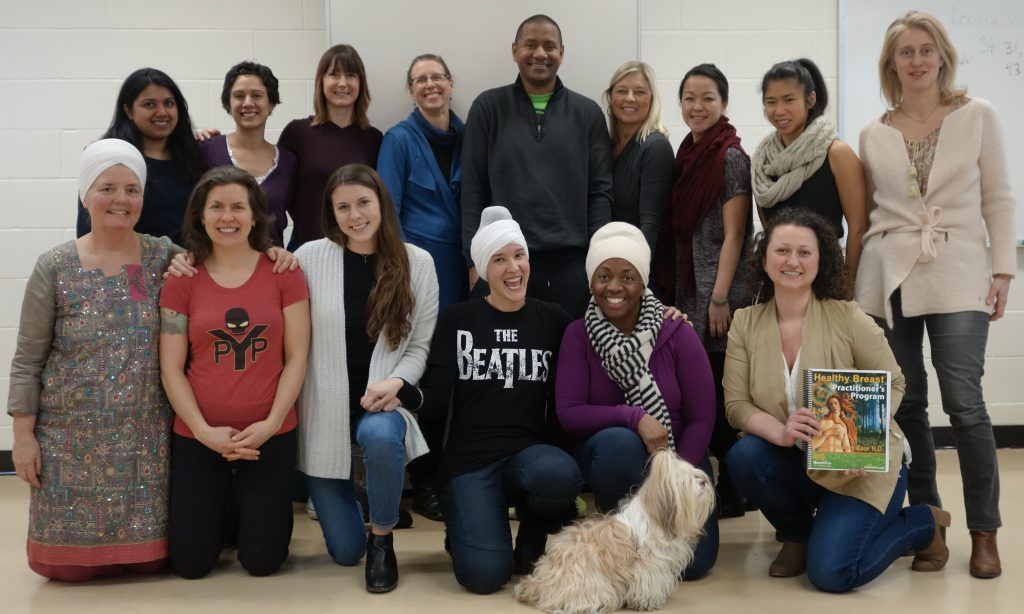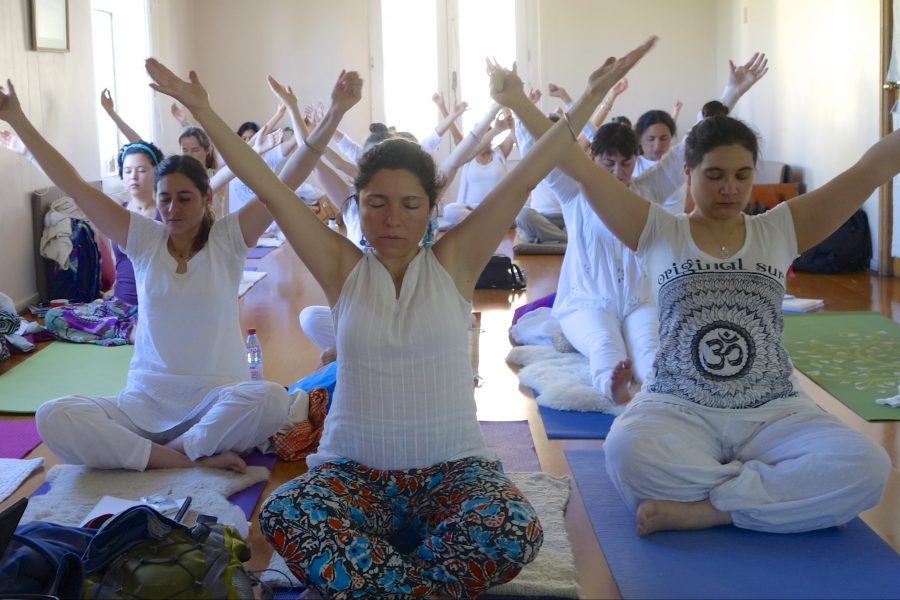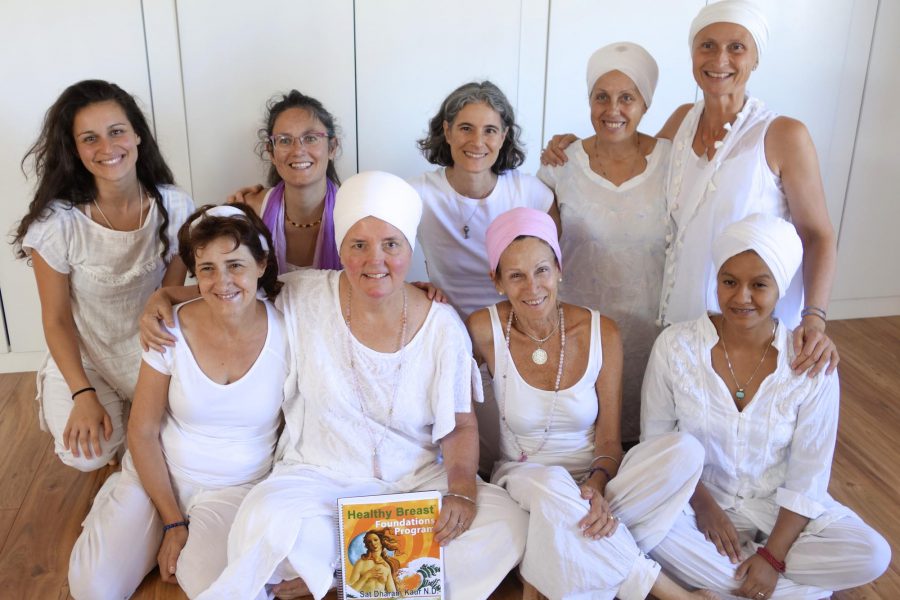About This Course
 The Healthy Breast Foundations Program is a pre-requisite for this course. Click here for upcoming courses.
The Healthy Breast Foundations Program is a pre-requisite for this course. Click here for upcoming courses.
Learn how to treat women interested in maintaining or improving the health of their breasts with diet, nutritional supplementation, botanical medicine, acupuncture, detoxification strategies, immune building regimens and hormone balancing protocols. Learn which diagnostic tests – blood, saliva, urine you can use to better assess risk factors for breast cancer and to follow a woman’s health progress. Learn how to work as a team with medical doctors, physiotherapists, lymphatic drainage specialists and when to refer. Become skilled as a healing resource for women to turn to for breast health advice and coaching.
This weekend will also give you more skills to teach and facilitate support groups based on Sat Dharam Kaur’s Healthy Breast Program as described in her books “A Call to Women” and “The Complete Natural Medicine Guide to Breast Cancer”. This training was created as a tool to help women both prevent and treat beast cancer using naturopathic therapies, psychological and spiritual exercises, kundalini yoga, and environmental activism.
Course Outline
The Healthy Breast Practitioner Program, provides more detailed information on treatment strategies and is designed for health care practitioners such as MDs, NDs, DCs, nutritionists, nurses, massage therapists, acupuncturists, osteopaths and herbalists.
We teach the Healthy Breast Practitioner Program annually at the Canadian College of Naturopathic Medicine in Toronto to licensed health care practitioners to help standardize an effective naturopathic program in breast cancer prevention. We share current research and best practices.
- global statistics
- risk factor assessment
- breast health balance sheet
- breast diseases and their relationship to breast cancer
- comparison of screening techniques
- guidelines for screening
- breast cancer tumour markers
- metabolic tests to assess risk
- darkfield microscopy
- types of breast cancer
- stages of breast cancer
- prognostic factors
- Canadian Medical Association Protocol for diagnosing breast cancer
- infection, chronic inflammation and cancer
- the cancer process
- what to ask during your interview
- how to listen
- how to maintain rapport
- conscious communication with patients
- breast exam
- patients’ needs, depending upon treatment stage
- best timing for surgery; naturopathic support for surgery
- priorities of naturopathic treatment during chemo
- priorities of naturopathic treatment during radiation
- considerations in designing your treatment plan
- after-care support and monitoring
- how to encourage long-term compliance
- ways to improve lymphatic circulation
- single botanicals for lymphatic support
- comparison of classic formulas
- botanicals that kill breast cancer cells
- immune function and cancer
- mind-body medicine and immune system health
- botanicals that support the immune system
- immune support formulas
- medicinal mushrooms and immune support
- homeopathic remedies for women with breast cancer
- essential and herbal oils used to treat breast cancer
- acupuncture treatment for immune support
- yoga for immune support and lymphatic circulation
- hormonal links to breast cancer
- estrogen
- progesterone
- testosterone
- thyroid function
- insulin-like growth factor
- insulin
- prolactin
- cortisol
- melatonin
- hormones that increase risk
- hormones that decrease risk
- hormonal interactions related to breast cancer
- hormone balancing strategies in breast cancer prevention
- hormone tests to assess breast cancer risk
- bio-identical hormones and breast cancer
- categories of environmental causes breast cancer
- how to avoid them
- strategies to mimimize harm
- radiation
- electromagnetic fields
- plastics – bisphenol A, phthalates, PVC
- fire retardants
- detergents
- pesticides
- heavy metals
- dental fillings
- environmental risk reduction plan for patients
- global action plan
- 8 Dietary Strategies for Breast Health
- foods to avoid
- phytoestrogens
- protein sources
- cancer fighting phytochemicals found in fruits and vegetables
- fresh vegetable juices
- brassicas
- garlic, onions and leeks
- turmeric, ginger
- sea vegetables
- sources of lycopene
- benefits of citrus
- benefits of pomegranate
- seeds, sprouts and cereal grasses
- facts on fiber
- fats to use and avoid
- foods to aid glycemic control
- benefits of mushrooms
- parsley, sage, rosemary, thyme
- spices which inhibit NFkB
- anntioxidant rich foods and spices
- goji berries
- green tea, chai and herbal teas
- food rotation
- intermittent fasting
- how to balance pH and body terrain
- how to decrease inflammation
- how to regulate blood sugar
- how to test for and eliminate Candida and parasites
- oncoviruses and treatment
- targeting stem cells
- assessing free radicals
- antioxidants
- foods versus supplements
- mineral testing and balance
- vitamin assessment and supplementation
- antioxidants, chemotherapy and radiation
- intravenous treatment overview
- treatment protocol during surgery
- treatment protocol during chemotherapy
- treatment protocol during radiation
- maintenance supplement schedule
- what does it mean to be toxic
- exotoxins
- endotoxins
- six phases of toxicity
- how do we detoxify
- naturopathic detoxification strategies
- cleansing through the seasons
- dental toxicity, heavy metal detoxification
- castor oil packs
- enemas
- sauna detoxification protocol
- drainage remedies
- infectious organisms and breast cancer
- the mind-body connection
- psychological states and breast cancer
- the link between stress and cancer
- conflict and cancer
- the biology of belief
- attitudinal healing
- flourishing attitudes
- replacing fear with acceptance
- the power of intention
- imagery and the mind-body connection
- affirmations for healing
- how to generate a healing response
- how to induce relaxation
- post-traumatic growth
- common denominators of remission
- the healing dream
- components of a daily mind-body practice
- mindfulness and healing
- meditations for healing
- yoga for healing
- cancer as a spiritual journey
- psycho-spiritual factors and breast cancer
- opportunities for prayer
- how do we pray
- the physician who prays
- healing prayers
- the importance of gratitude
- cultivating present moment awareness
- replacing fear with acceptance
- knowing through intuition
- the purpose-filled life
- stacking meaning
- non-doing and healing
- death teachings from a variety of traditions
- the transition from healer to death coach
- the language of transition
- the life inventory
- making peace with the past
- embracing love
- embracing forgiveness
- mantras and music for the dying process
- prayers to assist the soul’s journey
- the physician/patient relationship after cancer
- preventing physician burn-out
- components of the annual visit
- what’s the maintenance program?
- how to reframe cancer and empower the patient
- keeping your patient on track for life
- secrets to longevity
- the integrated care team
- the value of ongoing support
Instructors
Sat Dharam is a certified Kundalini Yoga teacher trainer and instructor, author, and naturopathic doctor practicing in Owen Sound, Ontario. She has studied Kundalini Yoga with Yogi Bhajan since 1976 and has facilitated teacher training programs in Toronto (ON), Canmore (AB), and New Mexico. She developed the Beyond Addiction program ... more
“Material was massive – covering many topics/areas of interest that were most helpful. From daily nutrition, hormones, nutritional support, detox, all the symptoms to lymphatic drainage was helpful – my concern was lymphatic drainage so I appreciated the helpful presentation.” ~ E.F.
Certification
Certification is available to you to become a Healthy Breast Educator and/or a Healthy Breast Yoga Instructor after completion of the course and after handing in the written assignments relevant to each of the twelve modules, as well as a video of you teaching one full module to a client or group.
Anyone is invited to attend the program, but certification as a Healthy Breast Yoga Instructor is available only to KRI certified Kundalini Yoga instructors who have also completed the Healthy Breast Foundations Program. This course combines both programs, so you will be eligible to be certified as both a Healthy Breast Educator and a Healthy Breast Yoga Instructor after completing the home practice program for each course and submitting a video of you teaching.
Location & Dates
Canadian College of Naturopathic Medicine
1255 Sheppard Avenue East, Toronto, Ontario
Fri, Jan 18, 2019 (6-9 pm); Sat, Jan 19 and Sun, Jan 20, 2019 (9 am – 5 pm)
Pricing
- ND/Healthcare Practitioner – $399
- Early Bird, on or before Dec 15 2018 – $359
- CCNM Alumni Assoc. Member/ Breast Cancer Survivor – $319
- Students – $279
Fee includes a teaching manual and HST
Register by calling CCNM at (416) 498-1255 ext. 255 or register online.
 The Healthy Breast Foundations Program is a pre-requisite for this course. Click here for upcoming courses.
The Healthy Breast Foundations Program is a pre-requisite for this course. Click here for upcoming courses.



